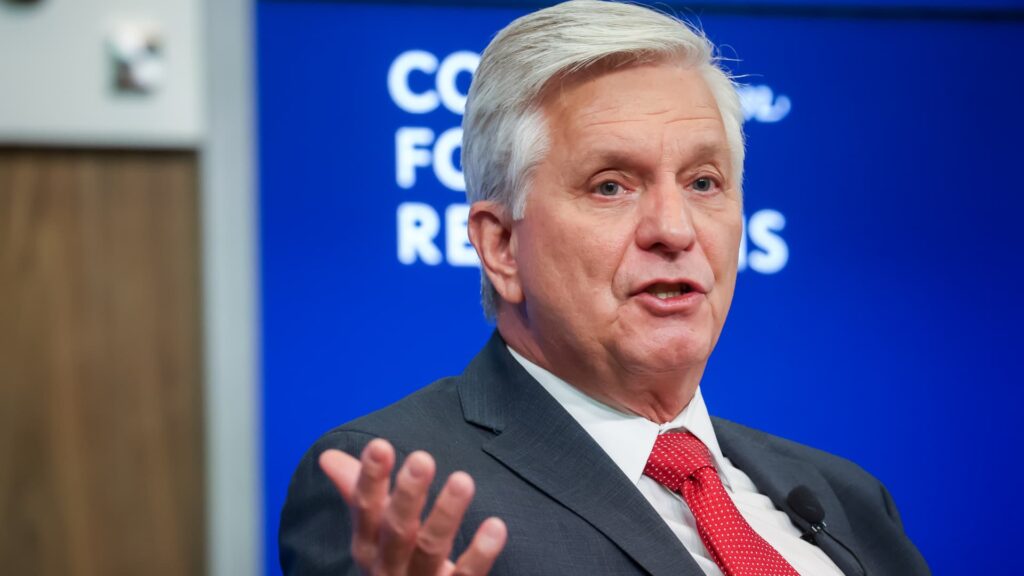Federal Reserve Governor Christopher Waller has indicated his support for a potential interest rate cut in December, citing growing concerns regarding the labor market and a significant decline in hiring rates. In a pivotal speech delivered to economists in London, he emphasized that his priority lies with labor market dynamics rather than inflation fears. His stance contrasts with some members of the Federal Reserve, who remain cautious about further rate cuts amid concerns of inflation resurgence. As markets await the December Federal Open Market Committee meeting, Waller’s comments add to the complexity of the ongoing economic discussion within the central bank.
| Article Subheadings |
|---|
| 1) Waller’s Concerns Over the Labor Market |
| 2) Diverging Views Within the Federal Reserve |
| 3) The Upcoming Federal Open Market Committee Meeting |
| 4) Analyzing Economic Data Amid Shutdown |
| 5) Risks of Restrictive Monetary Policy |
Waller’s Concerns Over the Labor Market
During a recent speech, Christopher Waller expressed significant apprehension regarding the current state of the labor market. He noted a worrying trend in job growth that has been evident over several months, heightening his urgency for a potential interest rate cut. Waller highlighted that the decline in hiring poses broader implications for economic stability, emphasizing that immediate action may be required to mitigate a worse outcome in the labor landscape. His proactive approach suggests that he seeks to address the challenges lower- and middle-income consumers are facing, aiming to foster an environment conducive to employment recovery.
Diverging Views Within the Federal Reserve
As discussions unfold regarding rate adjustments, the Federal Reserve is displaying a division in opinion among its officials. While Waller advocates for monetary easing to stimulate labor market strength, others, including several regional Fed presidents, argue against further cuts. They assert that inflation remains a tangible threat, potentially exacerbated by any additional monetary easing. This internal debate highlights the varying perspectives on how best to balance economic growth with inflation management, making the upcoming decisions even more critical. The differing positions within the Fed comprise a significant backdrop to Waller’s remarks, underscoring the complex challenges policymakers face.
The Upcoming Federal Open Market Committee Meeting
Set to convene on December 9-10, the Federal Open Market Committee (FOMC) meeting will be pivotal in determining the direction of interest rates. The recent trend towards rate cuts, with two successive reductions in September and October, has led to divided market expectations regarding the FOMC’s upcoming decisions. On one side, proponents like Waller argue for an additional quarter-point cut to bolster economic activities, while others, such as Vice Chair Philip Jefferson, have taken a more cautious stance, suggesting that policymakers should advance slowly in their deliberations. This division within the committee reflects the uncertainty that envelops the economic landscape as they assess the implications of their choices on both inflation and employment.
Analyzing Economic Data Amid Shutdown
Waller’s analysis was impacted by the recent government shutdown, which suspended the release of crucial economic data. In response to concerns about incomplete data influencing policy decisions, he asserted that there remains a wealth of both private and some public-sector information available, which although imperfect, provides actionable insights into the state of the economy. This determination reflects Waller’s confidence in formulating policy responses based on varied data sources despite the limitations imposed by the data freeze. Such a stance is crucial, as decisions made in upcoming meetings will depend heavily on the economic landscape painted by these available metrics.
Risks of Restrictive Monetary Policy
Waller has expressed concerns regarding the implications of restrictive monetary policy on economic recovery, particularly its impact on lower- and middle-income consumers. He cautioned that maintaining a stringent monetary stance may exacerbate existing challenges facing these demographics, suggesting that a rate cut could serve as a safeguard against the potential deepening of labor market vulnerabilities. By positioning a December cut as a necessary measure for risk management, Waller aligns with a proactive approach to creating a more neutral monetary policy environment, which he argues is essential for fostering a healthier economic landscape.
| No. | Key Points |
|---|---|
| 1 | Governor Christopher Waller supports a December interest rate cut due to concerns over the labor market. |
| 2 | There is a divide among Federal Reserve officials regarding the need for further rate cuts amidst inflation concerns. |
| 3 | The upcoming Federal Open Market Committee meeting will be critical in shaping future monetary policy. |
| 4 | Despite the recent government shutdown, Waller insists on the validity of alternative economic data for decision-making. |
| 5 | The risks of maintaining a restrictive monetary policy could harm lower- and middle-income consumers, according to Waller. |
Summary
The dialogue surrounding potential interest rate changes remains a critical element of economic discussion in the U.S. As Christopher Waller articulates his support for rate cuts in light of labor market vulnerabilities, the Federal Reserve grapples with balancing inflation control and stymying economic growth. The upcoming FOMC meeting is poised to affect both fiscal policy and consumer stability, making the need for informed decision-making paramount. Waller’s insights provide an essential perspective as the Fed navigates this complex terrain.
Frequently Asked Questions
Question: Why is Waller concerned about the labor market?
Waller is concerned because of the noticeable decline in job growth, which poses threats to economic stability and majorly impacts lower- and middle-income consumers.
Question: What are the central themes of the upcoming Federal Open Market Committee meeting?
The central themes involve deliberating potential interest rate cuts amid contrasting views on inflation threats and labor market conditions.
Question: How did the government shutdown affect economic data collection?
The government shutdown suspended the release of essential government economic data, prompting policymakers to rely on alternative private and limited public sector information for their analyses.
